 Petzlover
Petzlover Slovakian Hound is originated from Slovakia but St. John's Water Dog is originated from Canada. Slovakian Hound may grow 6 cm / 2 inches shorter than St. John's Water Dog. Slovakian Hound may weigh 24 kg / 52 pounds lesser than St. John's Water Dog. Both Slovakian Hound and St. John's Water Dog has almost same life span. Both Slovakian Hound and St. John's Water Dog has same litter size. Both Slovakian Hound and St. John's Water Dog requires Low Maintenance.
Slovakian Hound is originated from Slovakia but St. John's Water Dog is originated from Canada. Slovakian Hound may grow 6 cm / 2 inches shorter than St. John's Water Dog. Slovakian Hound may weigh 24 kg / 52 pounds lesser than St. John's Water Dog. Both Slovakian Hound and St. John's Water Dog has almost same life span. Both Slovakian Hound and St. John's Water Dog has same litter size. Both Slovakian Hound and St. John's Water Dog requires Low Maintenance.
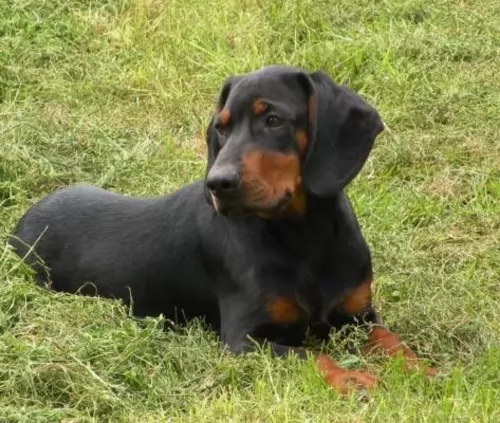 The Slovakian Hound is also known as the Slovenský Kopov or the Black Forest Hound. This is a scenthound which comes from Slovakia in Central Europe and has been bred for boar hunting.
The Slovakian Hound is also known as the Slovenský Kopov or the Black Forest Hound. This is a scenthound which comes from Slovakia in Central Europe and has been bred for boar hunting.
The breed was first recognized in the 1870s, with dogs such as the Austrian Black and Tan Hound as well as the Hungarian Greyhound being thought to be part of dogs ancestry. The breed club was established in 1988 and is recognized by the FCI.
 The breed known as the St. John’s water dog is an extinct landrace breed. They were domestic dogs found in Newfoundland and at times were called the lesser Newfoundland. There is not much information available about the other breeds that went into its development. Hypothetically it is believed they are a mix of the Irish, Old English and Portuguese dogs bred to work.
The breed known as the St. John’s water dog is an extinct landrace breed. They were domestic dogs found in Newfoundland and at times were called the lesser Newfoundland. There is not much information available about the other breeds that went into its development. Hypothetically it is believed they are a mix of the Irish, Old English and Portuguese dogs bred to work.
It is also thought that other breeds in their family tree, descending from them, include the Golden Retriever, the Flat-Coated Retriever, the Chesapeake Bay Retriever, the Labrador and the Curly-Coated Retriever. The Newfoundland is also related to the St. Johns Water Dog through the line of Rafeirio do Alenteios that Portuguese fisherman brought to the island.
The breed was exported to England in the 19th century and early 20th. There the breeds of retrievers were developed. In Canada during this time frame restrictions were placed on dog ownership in order to encourage people to raise sheep. At the same time England imposed a long quarantine on all animals coming into the country in order to get rid of rabies. These two factors contributed greatly to the extinction of the breed. It seems the last two dogs were seen in a remote area in the 1980’s. All attempts to save the breed failed.
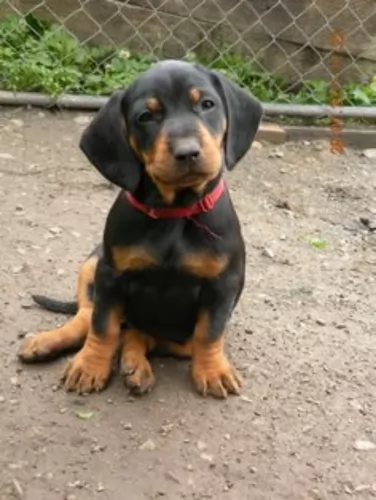 The Slovakian Hound is a muscular dog of medium height and with a long tail and long drop ears. The short coat is always black with tan markings.
The Slovakian Hound is a muscular dog of medium height and with a long tail and long drop ears. The short coat is always black with tan markings.
These compact looking dogs stand in height at about 43 to 47cm and weigh in the region of 14 to 17kg. The face is friendly and the eyes alert and bright.
Independent and intelligent, the Solvakian Hound will learn some basic commands easily. He is adaptable and will fit into life in the countryside as well as the city, so long as he is well exercised.
He is a sociable, playful dog and will do well with children, particularly if he has been trained and socialized. He is also a good choice for the first-time dog owner. He is alert and makes a good watchdog too.
 St. John’s Water Dog is strong, medium sized and stocky. They looked more like English Labs than American Labs. They had a thick, short coat, loved swimming, had a lot of endurance and rudder tail. It was also described as a thin, black dog with short hair. They had white patches on their chest and feet. His nose was thin and tapered, his legs powerful, his chest muscular. The breed is quick, swims, runs quickly and is a fighter as well.
St. John’s Water Dog is strong, medium sized and stocky. They looked more like English Labs than American Labs. They had a thick, short coat, loved swimming, had a lot of endurance and rudder tail. It was also described as a thin, black dog with short hair. They had white patches on their chest and feet. His nose was thin and tapered, his legs powerful, his chest muscular. The breed is quick, swims, runs quickly and is a fighter as well.
Never accepted by any major kennel club except as a foundation breed. They became extinct.
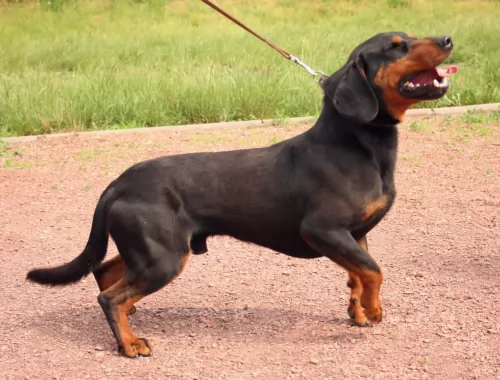 His job as a hunting dog has meant that the Slovakian Hound is a brave, energetic, determined dog.
His job as a hunting dog has meant that the Slovakian Hound is a brave, energetic, determined dog.
As a pet and companion, you won’t be disappointed as he puts as much effort into his relationships with his human family as he does with hunting.
This amicable dog makes a wonderfully loyal and devoted pet, companion and guard dog.
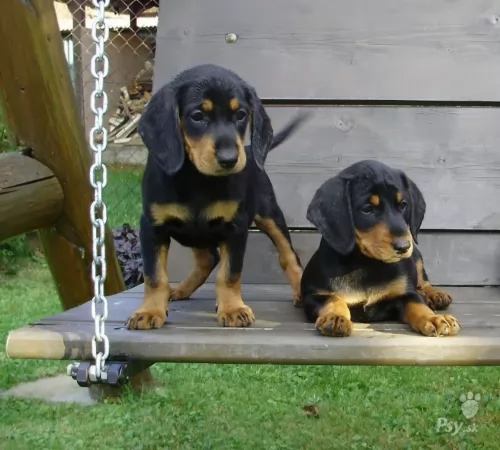 Most dogs at some or other time will be faced with a particular health challenge. Most times the veterinarian can fix these problems with the right kind of treatment.
Most dogs at some or other time will be faced with a particular health challenge. Most times the veterinarian can fix these problems with the right kind of treatment.
The Slovakian Hound is a healthy dog breed and you aren’t likely to come up with too many problems, though it it wise to be aware of some of the more common dog illnesses there are -
This is something you can expect as your Slovakian Hound ages. It is brought on by tissue degeneration. With eyes, dogs can develop cataracts. With his ears, consistently cleaning and watching out for ear infections can also help with slowing down hearing loss.
Apart from hip dysplasia which can start with even very young dogs, osteoarthritis can cause joint pain and stiffness of joints. It’s a degenerative disease, but fortunately there are a number of treatments to alleviate pain. Remember that nutrition plays a huge role in reducing joint problems in dogs.
Cancer is also a disease that has no respect for the age of the dog or dog breed. When you brush your pet, feel for any unusual lumps. Not all lumps are cancerous but it will be a good idea to have your pet checked over by the vet.
 There is no documented history of any genetic or hereditary illnesses in the breed. However, it seems rational to believe they suffered from ailments similar to Labradors and newfoundland though they are smaller dogs.
There is no documented history of any genetic or hereditary illnesses in the breed. However, it seems rational to believe they suffered from ailments similar to Labradors and newfoundland though they are smaller dogs.
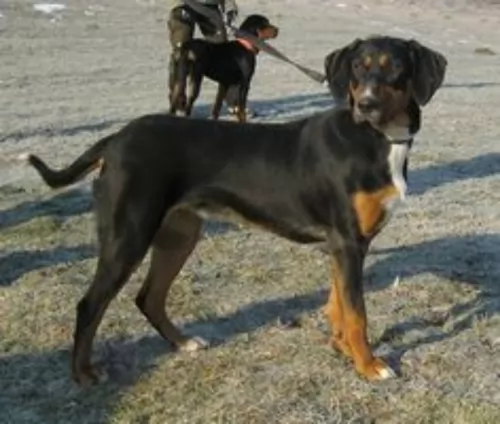 ● Like every other dog, the Slovakian Hound will need exercise if he is to remain healthy and fit. There are lots of back-yard games for dogs such as hide and seek and ball and rope games. He will also love a daily walk.
● Like every other dog, the Slovakian Hound will need exercise if he is to remain healthy and fit. There are lots of back-yard games for dogs such as hide and seek and ball and rope games. He will also love a daily walk.
● Always provide your dog with the best food there is as this encourages good health. Your Slovakian Hound requires top quality food, and while there are some good commercially manufactured foods on the market, it is important to choose the high quality ones that have natural, good ingredients in them.
Try to include some home-made food for him which can be simply mixed into the dry kibble twice a week. Boiled chicken, brown rice or pasta and spinach, sweet potatoes and carrots is super tasty and nutritious. Also try to include some raw meat into the diet occasionally as this helps with preventing skin diseases.
● Trim your Slovakian Hound's nails and check his eyes and ears for infection. The inside of the ears shouldn’t be red and the eyes should be clear and bright. If he will allow you to, check inside his mouth too to make sure there are no bad teeth.
● Don’t allow your dog to have puppies. There are so many unwanted puppies all over the world. Rather have him or her spayed or neutered to avoid puppies that nobody wants. It is beneficial for his health too.
 1Feeding the puppy – Don’t overfeed – they have a propensity toward obesity. Feed high quality, high protein 3 x a day.
1Feeding the puppy – Don’t overfeed – they have a propensity toward obesity. Feed high quality, high protein 3 x a day.
2.Feeding the adult – Don’t overfeed. Feed a high quality, high protein 1-2 x a day.
4. Games and Exercises – They need space to run and they love to explore. They would also love to be near water where they could swim. Good at dock diving, field trials, flyball and frisbee.